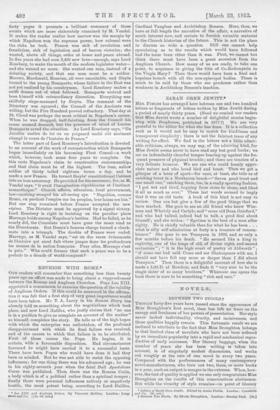SARAH ORNE JEWITT.* MRS. FIELDS has arranged here between one
and two hundred letters or fragments of letters written by Miss Jewitt during a period of nearly thirty years. (Need we remind our readers that Miss Jewitt wrote a number of delightful stories begin- ning with Deephaven, published in 1877 P) We are very grateful to the editor for what she has done. It is a collection such as it would not be easy to match for kindliness and transparent simplicity ; there is not the faintest trace of any writing for effect. We find in the letters not a little admir- able criticism, always, we may say, of the admiring kind, for Miss Jewitt seems never to have read any but good books; we see an indomitably cheerful temper bearing up against the fre- quent pressure of physical trouble; and there are touches of a very delicate humour. We see one who could keenly appre- ciate nature and who loved bird and beast. Then we get a glimpse of a lover of sport—for once, at least, she tells us of catching bloat in a Newhaven brook—" Seven good trout and one small one," catching them, too, in a really sporting fashion. "I got wet and tired, hopping from stone to stone, and liked it all as much as ever." These last words seemed to imply that it was an old taste. A book of this kind is not easy to review. One can but give a few of the good things that we have marked. She goes to see an old friend who knew Wise- man and Whately and Carlyle, and " cross old Dean Gaisford," and who bad talked, indeed had to talk, a good deal about himself ; and she writes : " Egotism is the best of a man after eighty. He is chiefly valuable then for what he has been . . . what is silly self-admiration at forty is a treasure of remem- brance." She goes to see Tennyson in 1892, and so only a few months before his death. "He seemed like a king in captivity, one of the kings of old, of divine right, and sacred seclusions " ; " it is the high court of poetry at Aldworth" ; "if some one had said, Come and see Shakespeare with me, I should not have felt any more or deeper than I did about Tennyson." Then there is a delightful account of how she is made a Litt.D. at Bowdoin, and finds it " very nice to be the single sister of so many brothers." Wherever one opens the book there is sure to be something "rich and rare."






































 Previous page
Previous page